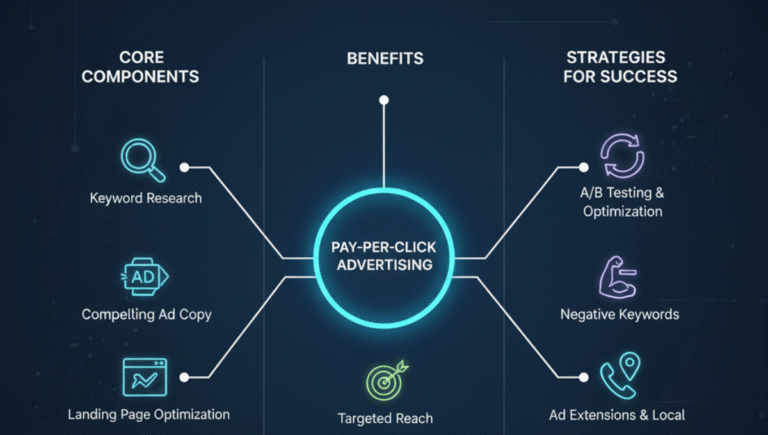In the rapidly evolving world of digital marketing, Pay-Per-Click (PPC) advertising has emerged as one of the most effective strategies for businesses aiming to increase their online visibility, drive targeted traffic, and boost sales. Whether you’re a seasoned marketer or a small business owner exploring new avenues for growth, understanding the fundamentals and nuances of PPC is essential. This article delves deep into what PPC entails, how it works, its benefits, best practices, and how you can leverage it to achieve your marketing goals.
What Is PPC? An Introduction
Pay-Per-Click (PPC) is an online advertising model where advertisers pay a fee each time their ad is clicked. Unlike organic search results that are earned through SEO efforts, PPC ads are paid placements, typically appearing at the top of search engine results pages (SERPs), social media feeds, or on relevant partner websites.
The most common platform for PPC advertising is Google Ads (formerly Google AdWords), but social media platforms like Facebook, Instagram, LinkedIn, and Twitter also offer PPC options. The core principle remains the same: advertisers bid on keywords or target audiences, creating ads that are displayed to users who are most likely interested in their offerings.
How Does PPC Work?
PPC functions through a bidding process in which advertisers vie against each other to secure prime ad positions. Here’s a simplified overview of the process:
- Keyword Selection: Advertisers identify relevant keywords related to their products or services.
- Creating Ads: Engaging and compelling ad copy is crafted to encourage clicks.
- Bidding: Advertisers set a maximum bid amount they’re willing to pay per click.
- Ad Auction: When a user performs a search or visits a webpage, an auction determines which ads are displayed based on bids, ad relevance, and quality score.
- Ad Display & Click: The winning ads are shown, and if a user clicks, the advertiser is charged the bid amount.
- Landing & Conversion: The user lands on the advertiser’s website, and if optimized, converts into a customer.
This process is dynamic; factors like ad quality, relevance, and bid amount influence the placement and cost.
Benefits of PPC Advertising
Investing in PPC offers numerous advantages:
- Immediate Results: Unlike SEO, which can take months, PPC delivers instant visibility.
- Targeted Reach: Ads can be tailored based on demographics, location, device, interests, and behaviors.
- Budget Control: Advertisers determine their daily or campaign budgets, ensuring cost-effectiveness.
- Measurable ROI: Detailed analytics and tracking tools allow precise measurement of campaign performance.
- Flexibility & Scalability: Campaigns can be adjusted in real-time, scaled up or down based on results.
- Brand Awareness: Even if users don’t click, ads increase brand visibility and recognition.
Key Components of a Successful PPC Campaign
To maximize ROI, consider these essential elements:
1. Keyword Research & Selection
Identify high-intent keywords relevant to your offerings. Use tools like Google Keyword Planner, SEMrush, or Ahrefs to discover keywords with good search volume and manageable competition.
2. Compelling Ad Copy
Create engaging headlines and descriptions that resonate with your target audience. Highlight unique selling points and include strong calls-to-action (CTAs).
3. Landing Pages
Ensure your landing pages are relevant, fast-loading, and optimized for conversions. A seamless user experience increases the likelihood of conversions.
4. Bid Strategy
Choose an appropriate bidding strategy—manual CPC, enhanced CPC, CPA, or ROAS—based on your campaign goals.
5. Targeting Settings
Refine your audience targeting to reach the right demographics, locations, devices, and interests.
6. Tracking & Analytics
Implement conversion tracking, UTM parameters, and analytics tools to monitor performance and optimize campaigns.
Best Practices for Effective PPC Campaigns
- Regular Monitoring & Optimization: Continuously analyze campaign data to identify what works and refine underperforming ads.
- A/B Testing: Test different ad copies, images, and landing pages to improve click-through and conversion rates.
- Negative keywords: help filter out unrelated search queries, ensuring your advertising budget isn’t squandered on unwanted clicks.
- Use Ad Extensions: Incorporate sitelinks, callouts, and other extensions to increase ad real estate and provide additional information.
- Stay Updated: PPC platforms frequently update features and policies; staying informed ensures your campaigns remain compliant and competitive.
Challenges & How to Overcome Them
While PPC is powerful, it comes with challenges:
- High Competition & Costs: Popular keywords can be expensive. Solution: Focus on long-tail keywords and niche targeting.
- Click Fraud: Competitors or bots may click on ads, inflating costs. Solution: Use click fraud detection and IP exclusions.
- Ad Fatigue: Overexposure can reduce effectiveness. Solution: Refresh ad creatives regularly.
- Complex Management: Campaigns require expertise. Solution: Consider professional management or automation tools.
Future Trends in PPC Advertising
The landscape of PPC is constantly evolving. Upcoming trends include:
- Automation & AI: Machine learning algorithms optimize bids and targeting in real-time.
- Voice Search Optimization: As voice assistants grow, optimizing for voice queries is becoming essential.
- Video & Visual Ads: Rich media formats increase engagement and brand recall.
- Cross-Channel Integration: Coordinating campaigns across search engines, social media, and display networks enhances reach.
Final Thoughts
PPC advertising serves as a highly effective instrument in the digital marketer’s toolkit. When executed correctly, it offers immediate visibility, precise targeting, and measurable results. Success requires strategic planning, continuous optimization, and staying abreast of platform updates and industry trends.
Whether you’re aiming to attract local customers, promote new products, or build brand awareness, understanding the ins and outs of PPC will enable you to craft campaigns that deliver real value. Embrace data-driven decision-making, test relentlessly, and adapt to changing market dynamics to unlock the full potential of pay-per-click advertising.
If you’d like assistance with creating or managing your PPC campaigns, consider consulting with digital marketing professionals or leveraging automation tools to streamline your efforts.
Start harnessing the power of PPC today—your business’s growth depends on it!
